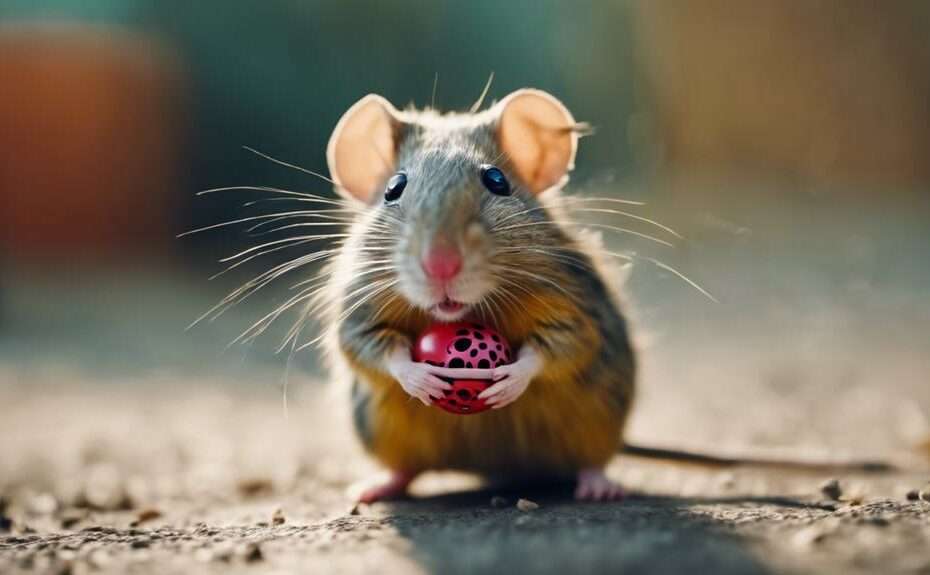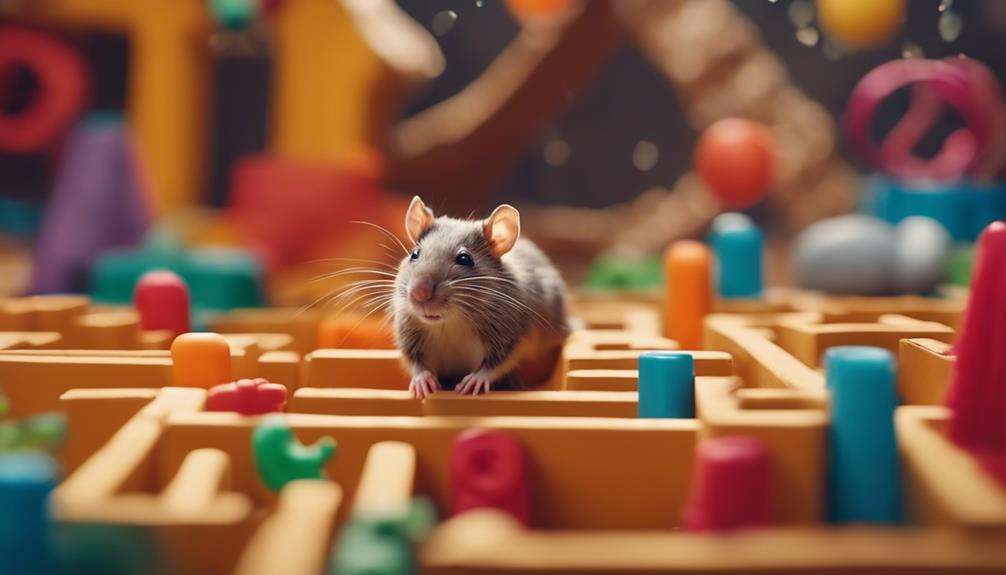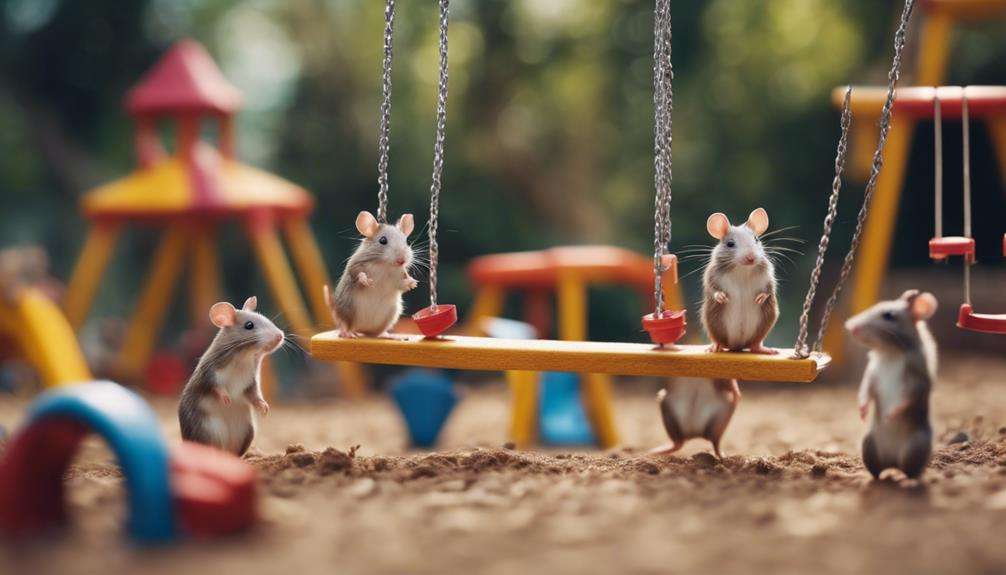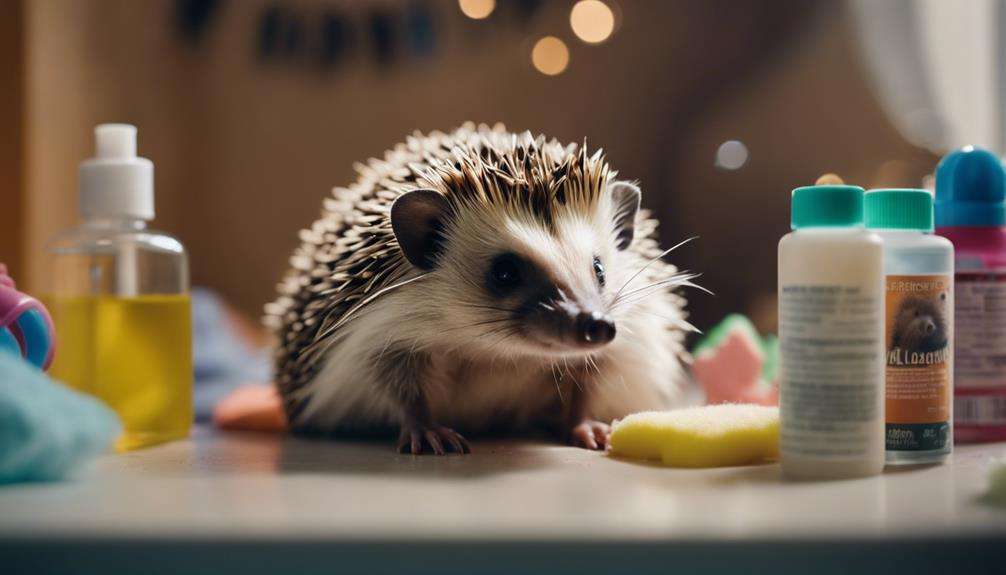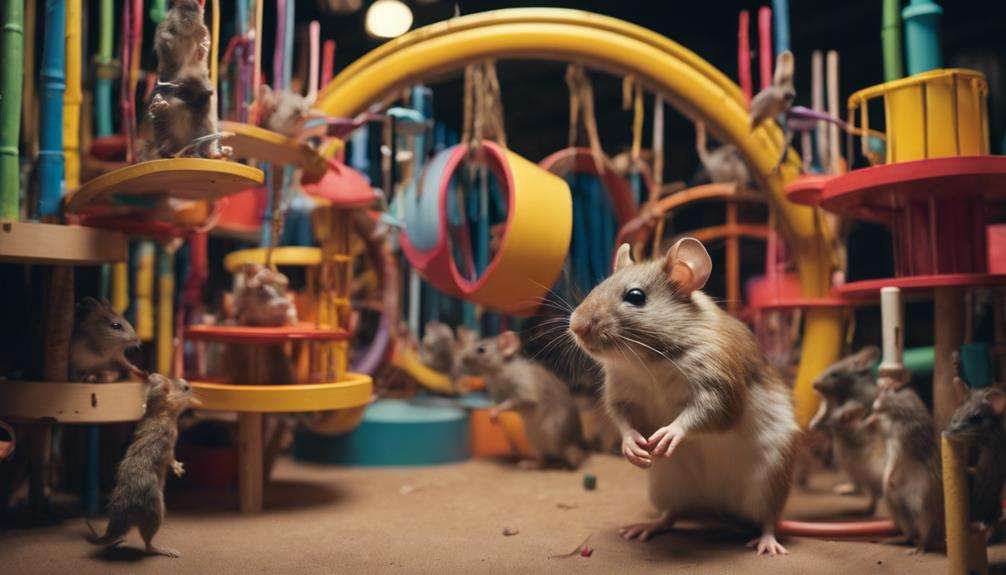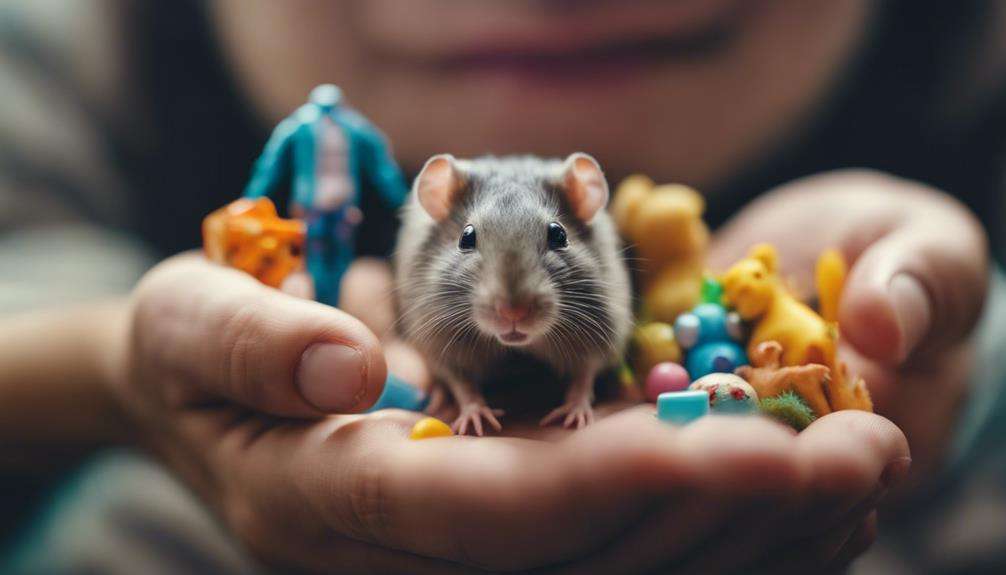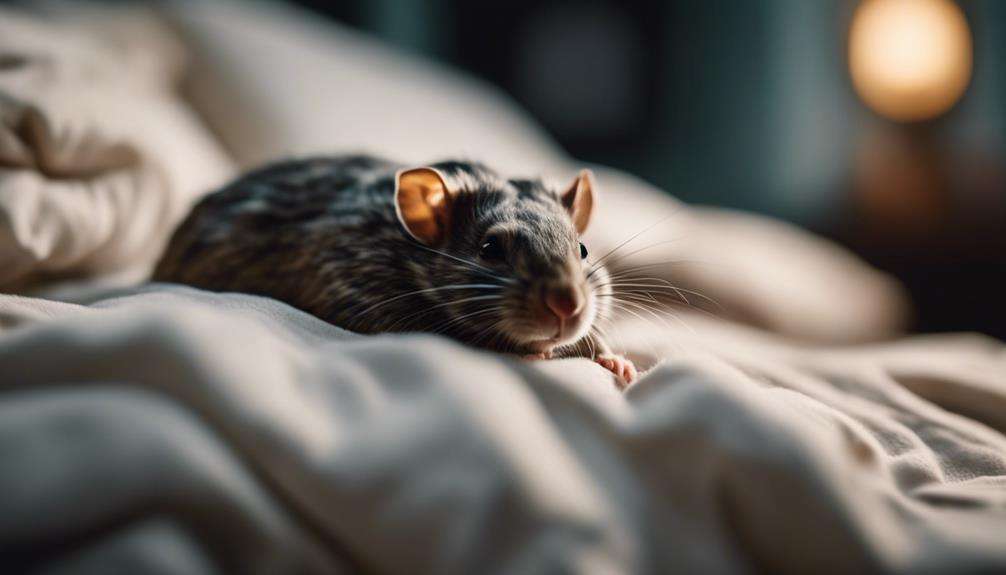Did you know that quirky rodents, like rats, have unique personalities and can make affectionate companions?
Their intelligence and ability to bond with humans might surprise you.
Consider a quirky rodent for a pet, and discover a rewarding relationship that goes beyond what you might expect from more conventional pets.
Key Takeaways
- Quirky rodents offer strong bonds and companionship with owners.
- Their long lifespan and high intelligence make them trainable and engaging pets.
- Low-maintenance dietary needs and adaptability to living with humans enhance convenience.
- Enriching their environment with proper care and nutrition promotes their well-being.
Benefits of Quirky Rodents
When considering the benefits of quirky rodents, it becomes evident that their capacity to form strong bonds with owners enhances companionship and affection in a unique and rewarding manner.
One significant advantage of having a quirky rodent, such as a rat, as a pet is their remarkable lifespan. Rats typically live for about three years, allowing for a long-term companionship experience. Over this time, they demonstrate high levels of intelligence, enabling them to be trained to perform tricks, which can be both entertaining for you and mentally stimulating for them.
Additionally, their specific dietary preferences make them relatively low-maintenance pets, as their nutritional needs can be easily met with readily available supplies. Introducing a companion rat can further enrich their environment, positively impacting their behavior and overall well-being by promoting a social setting that aligns with their natural tendencies.
Despite misconceptions, these quirky rodents are clean animals that bring joy to their owners through their playful and loving nature.
Choosing the Right Species
Considering the unique characteristics and behaviors of different rodent species is crucial when selecting the right pet for your home. When it comes to rodent species comparison, rats stand out for their social nature, intelligence, and ability to form strong bonds with their owners. Their playful and curious personality makes them engaging companions, particularly suitable for interactive pet owners. Rats are known to be more trainable compared to other rodent species, enjoying human interaction that can deepen the bond between pet and owner.
In terms of rodent care basics, rats have specific dietary needs, showing a preference for sunflower seeds and cooked spaghetti. Understanding these dietary requirements is essential when deciding to bring rats into your home. Moreover, rats' adaptability to living with humans and other pets makes them a versatile and rewarding choice for those seeking a quirky rodent companion. By considering these rodent behavior insights, you can make an informed decision on whether rats are the right species to welcome into your household.
Housing and Enclosures Tips
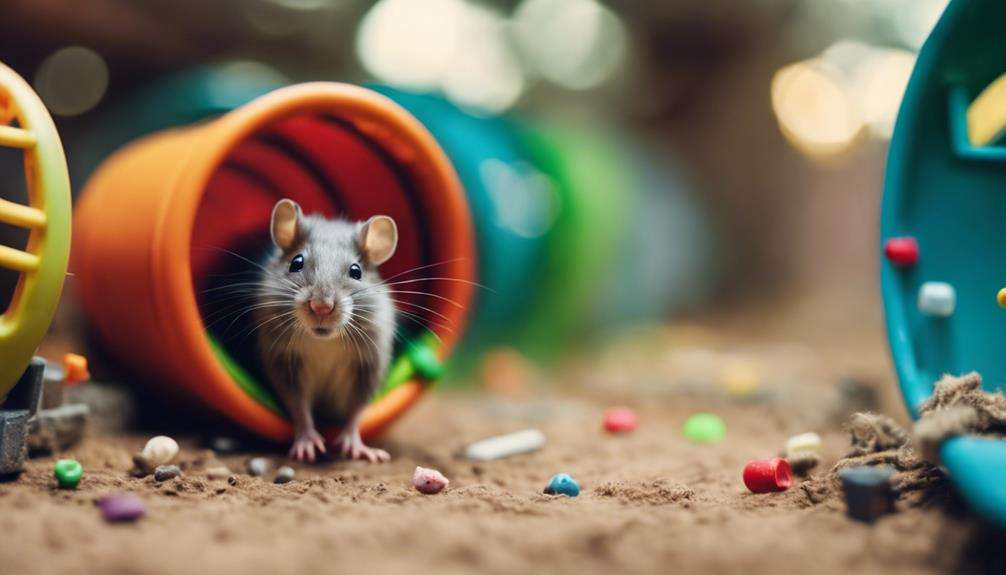
When setting up a habitat for your furry companions, it's crucial to provide a spacious cage with multiple levels for climbing and exploration.
Make sure to include cozy bedding materials like shredded paper or fleece to create a comfortable nesting environment.
Offering hiding spots such as tunnels, boxes, or igloos will help your rodents feel secure and safe in their new home.
Rodent Cage Essentials
For optimal well-being and enrichment of pet rats, it's crucial to provide a spacious cage equipped with various levels, platforms, hiding spots, and enrichment items. Rats are highly active and curious creatures, known for their climbing abilities and exploration instincts.
A well-designed cage setup with multiple levels and platforms mimics their natural habitat, allowing them to engage in natural behaviors and promoting physical activity. Including hiding spots such as tunnels or igloos is essential for rodents' sense of security and comfort, as they seek shelter in the wild.
Additionally, offering enrichment items like chew toys and puzzles is vital to keep rats mentally stimulated and prevent boredom. Ensuring proper ventilation in the cage is also crucial to maintain good air quality for your furry companions' health and well-being.
Ideal Bedding Options
An optimal choice for bedding options to consider for pet rats includes paper-based bedding, aspen shavings, or fleece liners, all of which provide comfort and absorbency. These bedding preferences are crucial for maintaining rat health, as materials like cedar or pine can pose respiratory concerns due to the release of aromatic oils.
Rats also enjoy nesting materials such as shredded paper, tissues, or hay, which cater to their natural behaviors of burrowing and nesting. Providing comfort options like these can significantly enhance your pet rat's well-being.
Regularly cleaning and changing the bedding is essential to prevent the buildup of ammonia and bacteria, ensuring a clean and hygienic living environment for your furry companions.
Enrichment Activities for Rodents
To enhance the well-being and natural behaviors of rodents in captivity, incorporating a diverse range of enrichment activities within their housing and enclosures is essential. DIY enrichment and interactive toys can provide mental stimulation and exercise activities crucial for their health.
Including elements that mimic their natural habitat, such as hiding spots, tunnels, and climbing structures, can encourage exploration and natural behaviors. Providing chew toys like cardboard tubes, hay, or wooden blocks helps prevent boredom and keeps rodents engaged. Rotating toys regularly prevents habituation, ensuring continued interest in the environment.
Adding running wheels or exercise balls offers physical activity opportunities. Creating multi-level habitats with ramps and platforms allows for exploration and exercise, contributing to the overall well-being of the rodents in captivity.
Nutrition and Diet Essentials
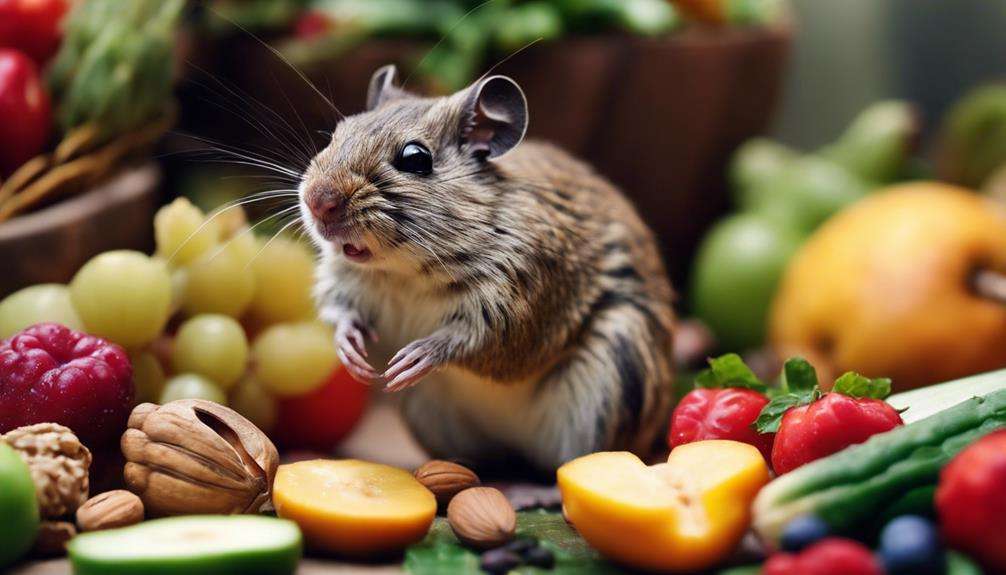
Properly meeting a pet rat's dietary needs is crucial to their health and well-being, necessitating a balanced diet of high-quality rat pellets, fresh produce, and occasional treats. When considering the nutrition and diet essentials for your pet rat, keep in mind the following dietary considerations:
- Nutrient Requirements: Rats require a diet rich in essential nutrients such as proteins, carbohydrates, fats, vitamins, and minerals to support their growth, energy, and overall health.
- Balanced Meals: Providing a well-balanced diet that includes a mix of rat pellets, fresh fruits, and vegetables ensures your pet rat receives all the necessary nutrients for optimal health.
- Dietary Considerations: It's important to avoid feeding your pet rat sugary, fatty, or processed foods, as these can lead to obesity and various health issues.
- Fresh Water: Access to fresh water should be available at all times to keep your pet rat hydrated and healthy.
- Consultation with a Veterinarian: Seeking guidance from a veterinarian specializing in small animals can help tailor a diet suitable for your pet rat's specific needs, ensuring they thrive and stay healthy.
Health and Veterinary Care
Regular veterinary check-ups are crucial for maintaining your rat's health and catching any potential issues early.
Respiratory infections, tumors, and dental problems are common health concerns in rats that require specialized care.
Ensure a balanced diet, a clean living environment, and mental stimulation to promote overall well-being in your quirky rodent companion.
Rodent Wellness Tips
How can you ensure optimal health and wellness for your pet rodent through proper veterinary care and attention to dietary and environmental needs? Rodents require specific care to thrive; here are some essential tips:
- Rodent grooming techniques: Regularly groom your rodent by gently brushing its fur to prevent matting and maintain cleanliness.
- Dental care tips: Provide chew toys and hard foods to help wear down your rodent's continually growing teeth.
- Exercise routines: Encourage physical activity by offering exercise wheels or supervised playtime outside of the cage.
- Balanced diet: Offer a varied diet of fresh vegetables, high-fiber pellets, and occasional fruits and seeds in moderation.
- Clean environment: Keep your rodent's habitat clean and well-ventilated to prevent respiratory issues and maintain overall health.
Vet Visit Importance
Ensuring the optimal health of your pet rodent involves prioritizing regular veterinary visits to monitor their well-being and address any potential health issues promptly. Preventative care is key to maintaining your rodent's health, as these visits allow for early detection of any underlying conditions.
Wellness checks conducted by a knowledgeable veterinarian are essential for thorough health monitoring, ensuring your rodent's holistic care needs are met. These visits enable the vet to provide valuable guidance on aspects like diet, housing, and enrichment, all of which contribute to your rodent's overall well-being and happiness.
Health Check Frequency
For optimal health and well-being of your pet rat, scheduling a yearly health check with a veterinarian is crucial to monitor for any potential health issues. Regular health checks offer preventive care benefits and aid in early detection, ultimately contributing to the longevity of your rat.
By observing your rat's behavior, appetite, and activity levels, you can assist in monitoring their health and wellness between veterinary visits. Additionally, veterinary care may encompass dental checks, parasite prevention, and vaccinations tailored to your rat's specific health requirements.
Early detection and treatment of health issues through these regular check-ups play a vital role in ensuring a long and healthy life for your beloved pet.
Enrichment and Toys Ideas
Introduce diversity into your rat's environment through the strategic selection of enrichment toys and activities that promote mental and physical engagement.
Toy rotation is key to preventing boredom and maintaining your rat's interest in their surroundings. Consider DIY options like cardboard boxes, paper tubes, and hanging ropes to provide inexpensive yet engaging play opportunities.
Interactive feeders and puzzle balls are excellent choices to stimulate your rat's mind and encourage physical activity. These toys can challenge your pet's problem-solving skills while also offering a rewarding treat.
Additionally, incorporating items that cater to your rat's natural behaviors, such as climbing ropes or tunnels, can help keep them active and entertained. Rats enjoy exploring and nesting, so providing them with toys that mimic these behaviors will enhance their overall well-being.
Training and Behavioral Tips
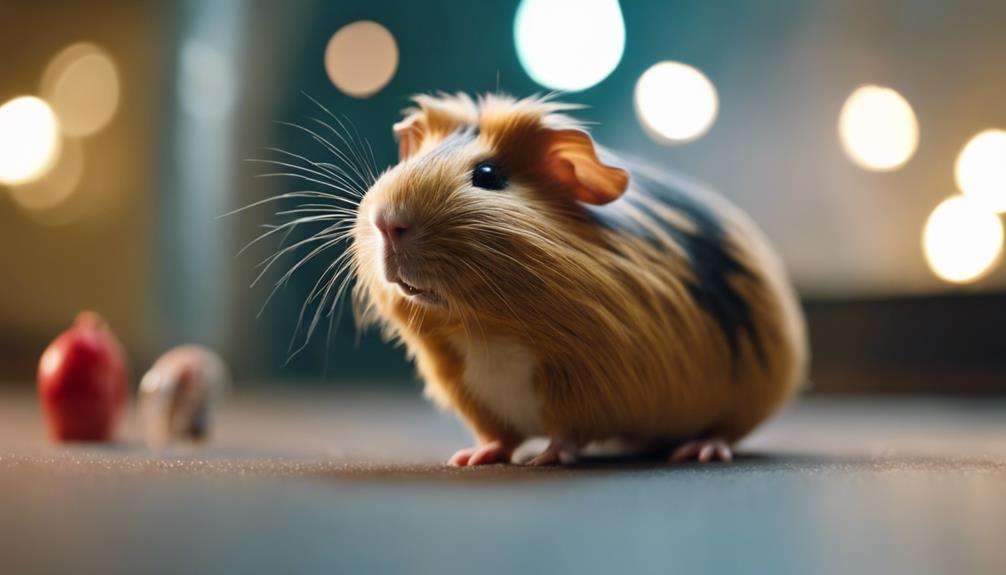
To enhance your rat's mental acuity and foster positive behaviors, consider utilizing positive reinforcement techniques like clicker training. Rats are intelligent animals that respond well to this method, helping reinforce good behaviors and strengthen the bond between you and your pet.
By engaging in training sessions that include advanced tricks, you can provide the mental stimulation necessary to prevent boredom and maintain your rat's sharpness. Remember to keep the sessions short and enjoyable to ensure your rat stays engaged and eager to learn new skills.
Consistency is key; through regular training and positive interactions, you can build trust and deepen the relationship with your rat. This approach not only benefits their behavioral development but also enriches your companionship.
With dedication and patience, you can unlock the full potential of your quirky rodent friend.
Frequently Asked Questions
What Makes Rodents Unique?
Rodent behavior, care, and intelligence are remarkable. Their constant gnawing, keen senses, and prolific breeding habits set them apart. Understanding these aspects of rodents is crucial for providing proper care and enrichment in captivity.
What Is Special About Rodents?
Do you know what sets rodents apart? Their intelligence allows for training, while their sociable nature craves companionship. Add in their playfulness with interactive toys, and you have the perfect recipe for a quirky pet.
What Are the Cons of Owning a Fancy Rat?
Regular cleaning is necessary for hygiene. Rats live 2-3 years; may trigger allergies. Specific diets are required. Loneliness may lead to depression. Consider health, behavior, and space needs before owning a fancy rat.
What Are Some Interesting Facts About Rodents?
Wondering about rodent behavior, habitats, and communication? Rodents exhibit diverse behaviors from spatial memory to eusocial living. They thrive in various habitats worldwide. Through scent marking, vocalizations, and body language, rodents effectively communicate within their communities.
Conclusion
When considering a quirky rodent as a pet, you're embarking on a unique and rewarding journey filled with companionship, playfulness, and love.
By choosing a rat, you aren't only challenging stereotypes but also opening yourself up to a fulfilling and loving relationship.
Embrace the opportunity to care for a social and intelligent creature, and you'll be rewarded with endless joy and enrichment in your life.
Experience the joys of having a quirky rodent as a pet today.
